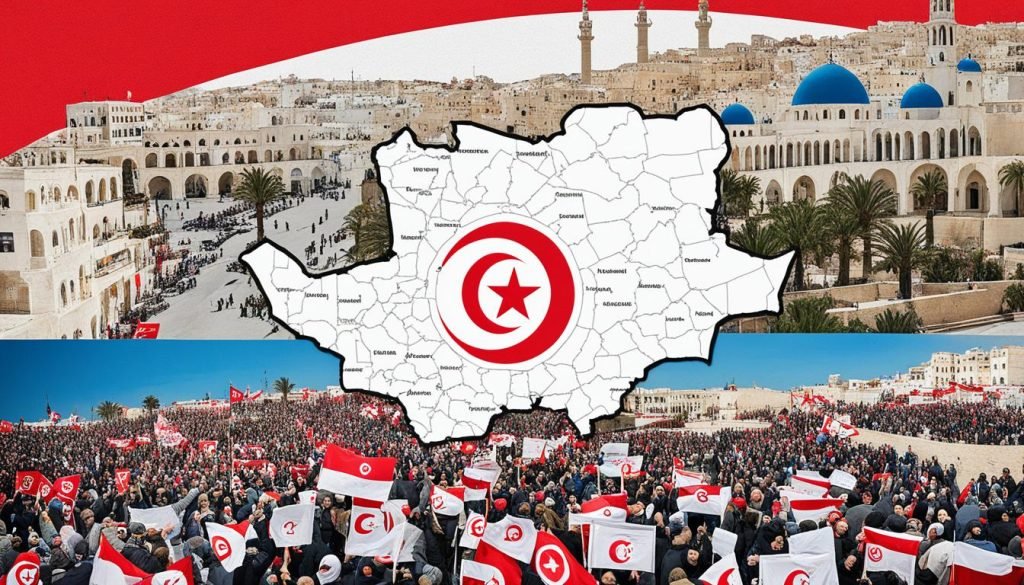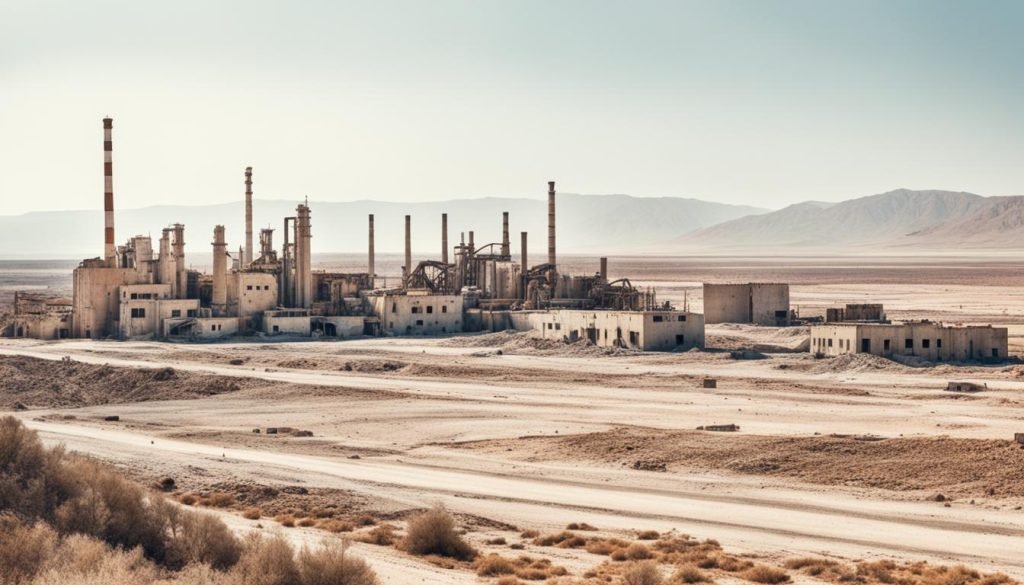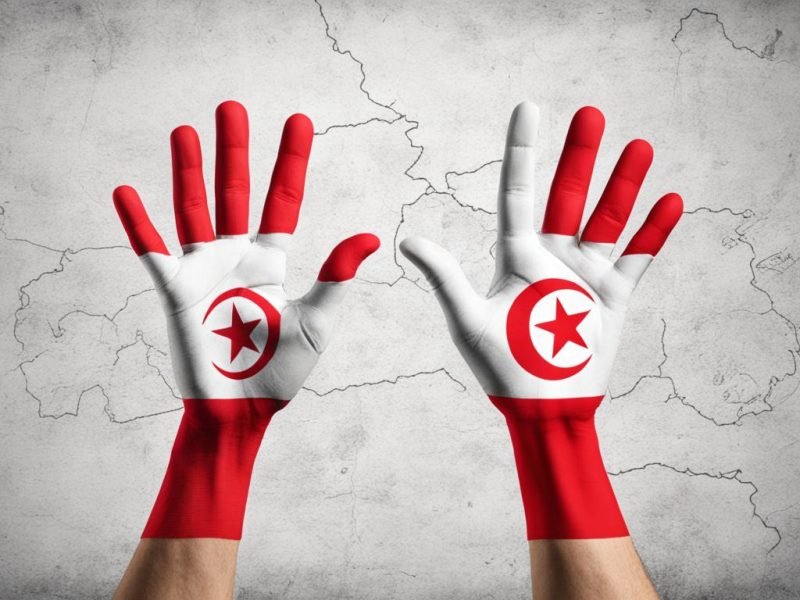In the world of politics, every country’s choice matters a lot. When Tunisia voted for a UN resolution against Russian aggression, people paid attention. But does this mean Tunisia is against Russia in the conflict with Ukraine? Let’s explore the deeper motives behind Tunisia’s position on this matter.
Tunisia has had tough times with its economy and politics lately. On July 25, 2021, President Kais Saied made moves to get more control. This action shows how vulnerable Tunisia is. Does this make Tunisia more open to influence from other countries on issues like Russia and Ukraine? The situation is very complex.
Key Takeaways
- Tunisia’s initial UN vote has stirred debate regarding its true alignment in the Russia-Ukraine conflict.
- Domestic pressures in Tunisia may sway its international decision-making.
- Speculation abounds on foreign influences impacting Tunisia’s geopolitical positions.
- The impact of President Kais Saied’s consolidation of power on Tunisia’s foreign policy is significant.
- Tunisia’s stance on the Russia-Ukraine conflict reflects a broader narrative of caution and complexity within African diplomacy.
Understanding Tunisia’s Foreign Policy Dynamics
Tunisia’s foreign policy has had to find a balance in a world full of turmoil. It works hard to keep its diplomatic relations steady between many countries. This is vital as the country faces challenges like those between Russia and Ukraine.
Tunisia’s Historic Diplomatic Practices
Tunisia chooses a careful approach to foreign policy. It balances its diplomatic moves with Russia and Ukraine. This keeps Tunisia’s interests safe and helps maintain good relations worldwide.
Such balance avoids taking sides too strongly. This approach guards Tunisia’s growth and stability.
Impact of Financial and Political Challenges
Since the 2011 revolution, money and politics have troubled Tunisia’s foreign policy. This has made diplomacy more complex. Especially with Russia and Ukraine, Tunisia must be smart and cautious.
It aims to get both economic and political support. Yet, it tries not to lose independence in the process.
Let’s look at how Tunisia’s relations with Russia and Ukraine have changed:
| Year | Relation with Russia | Relation with Ukraine |
|---|---|---|
| 2010 | Neutral engagements | Minimal direct interactions |
| 2015 | Increased cultural and economic ties | Diplomatic visits and discussions |
| 2020 | Strategic partnerships in energy | Continued economic dialogues |
| 2023 | Complex relations due to global politics | Heightened diplomatic engagements |
Looking at Tunisia’s foreign policy shows it’s always keeping a careful balance. This balance honors its past and aims for a bright future. It faces global and regional hurdles with smart diplomacy.
UN Voting Patterns: A Reflection of Tunisia’s Stance?
In looking at Does Tunisia Support Russia Or Ukraine?, Tunisia’s UN votes are key. First, Tunisia voted against Russia to support Ukraine. This matched worldwide efforts to protect country rights and law. This choice was partly due to talks with the International Monetary Fund (IMF) because of economic issues.
Later, Tunisia chose not to vote on kicking Russia from the UN Human Rights Council. This move might show a change in the Tunisia stance on Russia-Ukraine conflict. It could be due to outside pressure and politics in the area, especially from Algeria. Algeria’s way of keeping its foreign policy balanced likely influenced Tunisia.
The changes in how Tunisia votes at the UN show how complex its role is globally. Its actions bring up big questions about its foreign policy moves. Especially in dealing with the tough situation between Russia and Ukraine.
External Pressures Shaping Tunisia’s Diplomatic Moves
Tunisia’s global ties are shaped by forces outside its borders. This is key to understanding its global conflict stance. The situation tests Tunisia’s independence. It shows how it balances regional and global pressures. The country’s neutral stance in the Russia-Ukraine conflict shows this careful balance. It deals with pressures from the International Monetary Fund (IMF) and countries like Russia and the USA.
The Role of International Monetary Fund (IMF) in Tunisia’s Decisions
Tunisia needs help from places like the IMF due to its financial troubles. These deals affect its relations with countries like Russia and its global conflict positions. Being in need of financial aid, Tunisia’s diplomatic choices could lean towards those offering help.
US Influence on Tunisia and Its Consequences
The USA affects Tunisia through sanctions, diplomacy, and talks. The US’s sway over the IMF’s choices further twists Tunisia’s financial and political stories. This influence helps Tunisia stay neutral in the Russia-Ukraine conflict. It aims to keep its global relationships balanced.
| Factor | Influence on Tunisia’s Diplomacy |
|---|---|
| IMF Economic Support | Vital for short-term economic stability but influences long-term diplomatic freedom |
| US Geopolitical Interests | Shapes Tunisia’s actions on international platforms including votes on global conflicts |
| Tunisia’s Need for Neutrality | Essential to maintain balanced international relations, especially with major powers like Russia and EU countries |
In conclusion, financial needs and global politics explain Tunisia’s careful diplomacy in the Russia-Ukraine conflict. Such moves highlight Tunisia-Russia ties and showcase a strategy of neutrality shaped by outside pressures.
Does Tunisia Support Russia Or Ukraine? Analyzing Public Opinion and Government Actions
How Tunisia views Russia and Ukraine relations is not simple to understand. It involves looking at what the government does and what the people think. The government tries to stay neutral. But many people in Tunisia seem to like Russia more than the West. This difference is interesting and important.
The government wants to keep things balanced. It did not vote in some big United Nations decisions about Russia. This shows Tunisia is trying to be careful in world politics. It wants to protect its own interests without making big problems with other countries.
On the other hand, many Tunisians seem to support Russia a bit. They don’t like it when Western countries interfere in the Middle East. This feeling comes from past actions by Western countries in the region. People also think Western economic plans are not good for them.

The table below shows differences between what the government does and what people think about Russia and Ukraine:
| Aspect | Government Actions | Public Opinion |
|---|---|---|
| UN Voting Behavior | Abstained from key votes against Russia | N/A |
| General Sentiment | Maintains a neutral, strategic stance | Critical of the West, slight support for Russia |
| Influence Factors | Geopolitical strategy, International relations | Historical grievances, Antipathy towards Western policies |
Tunisia’s stance on the Russia-Ukraine conflict is complex. The government is playing it safe in world politics. Meanwhile, many people in Tunisia lean towards supporting Russia. This shows they are not happy with the West. Understanding this helps us see Tunisia’s position in global issues.
Russia’s Growing Influence in North Africa and Tunisia’s Position
Recently, Russia has been making big moves in North Africa. Tunisia is now closely linked with Russia. This connection is due to politics and culture. As we look into Tunisia and Russia’s relationship, we see its big impact. This comes from both history and recent changes.
Russia’s Cultural Diplomacy and Media Strategy in Tunisia
Russia is reaching out to Tunisia through culture and media. Russian leaders often visit Tunisia. This shows they want to build strong ties. They also opened centers to teach the Russian language and culture to Tunisians. This helps people from both places understand each other better.
The Breadth of Russian-North African Relations
Russia is also connecting with other North African countries. They are making deals in areas like business and politics. This makes their relationship strong. It shows a big change in the region. This change is partly because of how countries view Western policies nowadays.
To sum up, watching how Tunisia and Russia get along is very interesting. It tells us a lot about Russia’s role in North Africa. History and current events are making a new story in this region. This could really change which countries are most powerful there.
The Economic Impact of the Russia-Ukraine Conflict on Tunisia
The Russia-Ukraine war affects countries everywhere. Tunisia is feeling the stress in its economy and politics. The country needs a lot of imports, like grain and energy. This war shows how weak Tunisia’s economy can be.
Dependency on Russian Energy and Ukrainian Grain
Tunisia gets a lot of its grain from Ukraine. This is very important for feeding its people. But the war has stopped these imports. Now, Tunisia needs to find other suppliers. At the same time, Tunisia buys a lot of energy from Russia. The war makes this situation very tricky.

Risks and Reactions within the Tunisian Economy
Not getting grain and energy is a big problem. It could also affect Tunisia’s politics. For example, new grain suppliers from Europe might ask for political favors. This could change who Tunisia is friends with.
This situation could make things more expensive. It could also hurt tourism. Tunisia worries about losing tourists from Russia and nearby countries.
To deal with these problems, Tunisia is looking for new partners. They are trying to make deals to help right now. But they also need a strong plan for the future. This will help Tunisia handle tough situations like this war.
Conclusion
In my quest to understand Tunisia’s view on the Russia-Ukraine conflict, I’ve learned a lot. I saw how Tunisia tries to balance things carefully. They want to keep good relations with everyone. But it looks like they’re leaning a bit towards Russia. This makes us wonder: does Tunisia favor Russia or Ukraine?
Looking deeper into Tunisia’s foreign policy, we see they’re worried about their economy. They also think a lot about what other countries do and say. Many people in Tunisia feel closer to Russia than the West. This shows Tunisia’s foreign policy isn’t simple. It’s about being smart and fitting in with regional feelings.
Tunisia’s actions in the Russia-Ukraine situation are complex. They’re trying hard to keep the country stable and prosperous. Tunisia doesn’t fully side with Russia or Ukraine. They want to make their own choices without too much outside pressure. Tunisia keeps balancing their needs and relationships with different countries.







